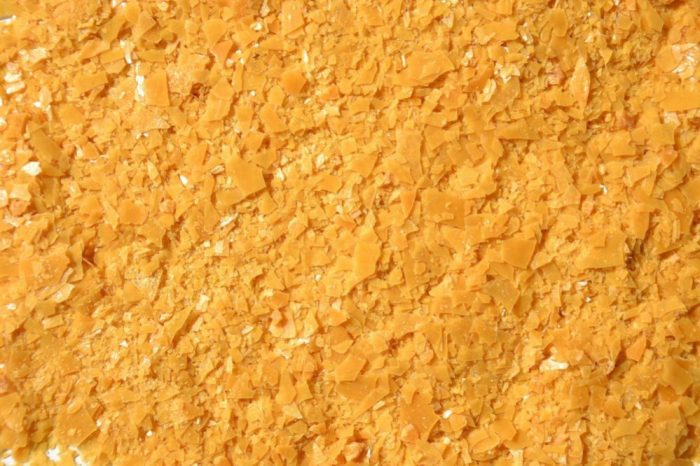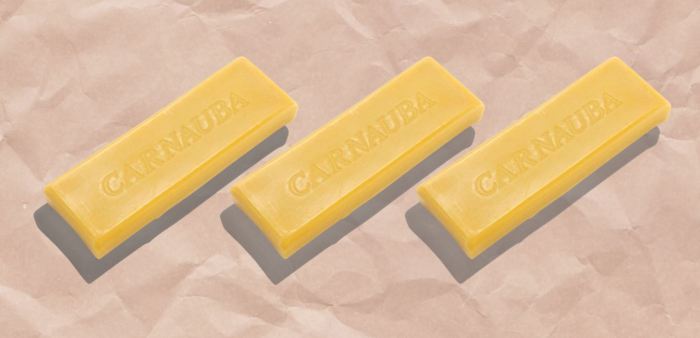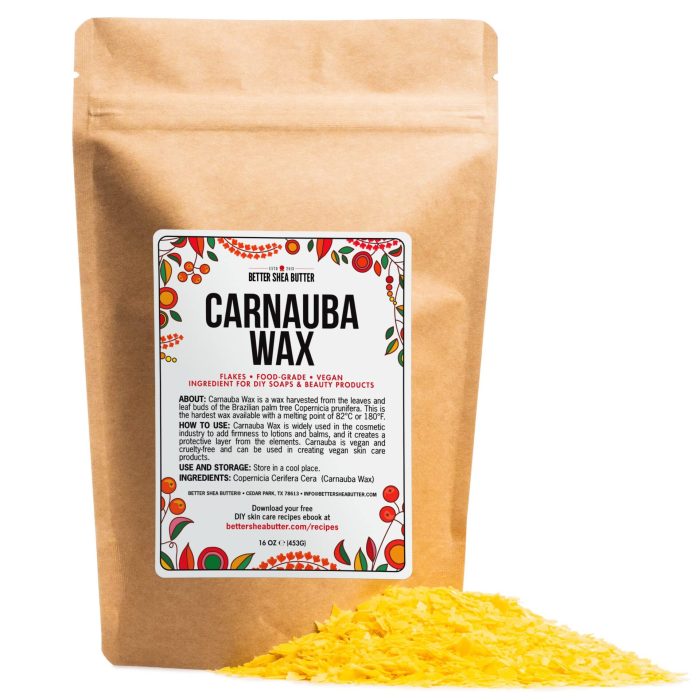Does carnauba wax cause cancer? This question sparks concerns among health-conscious individuals. Carnauba wax, a natural wax derived from the leaves of the Brazilian palm tree, is widely used in various industries. While it imparts a lustrous shine and protective coating, its potential health effects have raised eyebrows.
Join us as we delve into the scientific evidence, exploring the potential health risks associated with carnauba wax and providing guidelines for safe usage.
Carnauba wax, composed primarily of esters, fatty acids, and hydrocarbons, has unique properties that make it a valuable ingredient in a plethora of products, including food, cosmetics, and automotive finishes. However, concerns have been raised regarding its potential toxicity, particularly its link to cancer.
Let’s unravel the truth behind these claims and equip you with the knowledge to make informed decisions.
Health Risks Associated with Carnauba Wax

Carnauba wax, a natural wax derived from the leaves of the carnauba palm, is commonly used in various industries, including food, cosmetics, and automotive care. While generally considered safe for topical use, concerns have been raised regarding its potential health risks, including links to cancer.
Limited scientific evidence suggests that carnauba wax may contain trace amounts of potentially harmful substances, such as polycyclic aromatic hydrocarbons (PAHs) and heavy metals. PAHs are known carcinogens, while heavy metals can accumulate in the body and cause various health issues.
However, the levels of these substances in carnauba wax are typically very low, and further research is needed to establish a definitive link between carnauba wax exposure and cancer.
Evidence and Studies
Several studies have investigated the potential health risks of carnauba wax, but the results have been inconclusive. Some studies have found no significant association between carnauba wax exposure and cancer, while others have suggested a potential link. For example, a study conducted by the National Institute of Occupational Safety and Health (NIOSH) found that workers exposed to carnauba wax in the automotive industry had an increased risk of developing lung cancer.
However, this study was limited by its small sample size and lack of control for other potential risk factors.
Overall, the available scientific evidence on the health risks of carnauba wax is limited and inconclusive. More research is needed to determine the potential carcinogenicity of carnauba wax and to establish safe exposure limits.
Chemical Composition of Carnauba Wax
Carnauba wax is a natural wax derived from the leaves of the carnauba palm tree. It is composed of a complex mixture of esters, alcohols, and hydrocarbons.
The major components of carnauba wax are:
- Esters (75-85%): These are compounds formed by the reaction of a fatty acid with an alcohol. The main esters in carnauba wax are myristyl cerotate, ceryl cerotate, and myristyl palmitate.
- Alcohols (10-15%): These are compounds that contain a hydroxyl group (-OH). The main alcohols in carnauba wax are cetyl alcohol, myristyl alcohol, and lauryl alcohol.
- Hydrocarbons (5-10%): These are compounds that contain only carbon and hydrogen atoms. The main hydrocarbons in carnauba wax are octacosane, nonacosane, and triacontane.
The chemical structure of carnauba wax may influence its potential toxicity. For example, the presence of long-chain fatty acids and alcohols may contribute to its water-repellent properties. Additionally, the presence of certain esters may contribute to its antimicrobial activity.
Safety Precautions for Using Carnauba Wax

Carnauba wax is generally considered safe for use, but it’s essential to take proper precautions to minimize potential health risks. Here are some safety guidelines to follow:
Proper Ventilation
- Ensure adequate ventilation when using carnauba wax, especially in enclosed spaces.
- Open windows and doors to allow fresh air to circulate.
- Consider using a fan or air purifier to enhance ventilation.
Protective Gear
- Wear gloves to protect your hands from contact with carnauba wax.
- Wear a dust mask or respirator to prevent inhalation of wax particles.
- Wear safety glasses to protect your eyes from splashes or flying particles.
Storage Recommendations
- Store carnauba wax in a cool, dry place away from heat and direct sunlight.
- Keep containers tightly closed to prevent contamination and moisture absorption.
- Dispose of used carnauba wax properly according to local regulations.
Applications of Carnauba Wax: Does Carnauba Wax Cause Cancer

Carnauba wax finds diverse applications across industries due to its unique properties, including its hardness, gloss, and water resistance. It is highly sought after in various sectors, including food, cosmetics, and automotive.
The food industry utilizes carnauba wax as a glazing agent for fruits and vegetables, imparting a shiny and protective coating that extends their shelf life. In the cosmetics industry, it is employed in lipsticks, mascaras, and hair styling products to enhance their texture, durability, and water resistance.
Even though there is no definitive answer to whether carnauba wax causes cancer, some research suggests it may be a potential carcinogen. If you’re concerned about the potential health risks of carnauba wax, you can find a map of ancient greece laconia online to explore other regions where carnauba wax is not commonly used.
Additionally, you can look for products that are made with alternative waxes, such as beeswax or soy wax.
Automotive Industry
In the automotive industry, carnauba wax plays a significant role in the production of high-quality car waxes and polishes. Its natural ability to repel water and provide a durable shine makes it ideal for protecting vehicle surfaces from harsh weather conditions and enhancing their aesthetic appeal.
Alternatives to Carnauba Wax

Carnauba wax, while effective, is not the only option for surface protection. Various natural and synthetic alternatives offer comparable or even superior properties, depending on the specific application.
Natural Waxes
- Beeswax:Derived from honeybees, beeswax is a versatile and durable wax with water-repellent properties. It is commonly used in cosmetics, candles, and wood finishes.
- Candelilla Wax:Obtained from the candelilla plant, this wax is harder than carnauba and offers excellent shine and water resistance. It is widely used in cosmetics, polishes, and food coatings.
- Soy Wax:A biodegradable and renewable resource, soy wax is derived from soybeans. It is commonly used in candles, but its application is expanding to other areas due to its low melting point and high gloss.
Synthetic Waxes, Does carnauba wax cause cancer
- Polyethylene Wax:A petroleum-based wax, polyethylene wax is highly durable and resistant to chemicals and moisture. It is often used in coatings, packaging, and electronics.
- Polytetrafluoroethylene (PTFE) Wax:Commonly known as Teflon, PTFE wax is known for its exceptional non-stick properties. It is widely used in cookware, aerospace, and medical applications.
- Silicone Wax:A synthetic wax derived from silicone, silicone wax offers water repellency, heat resistance, and flexibility. It is commonly used in personal care products, electronics, and automotive applications.
The choice of alternative wax depends on factors such as desired properties, cost, sustainability, and compatibility with the intended application.
Helpful Answers
Is carnauba wax safe for consumption?
While carnauba wax is generally recognized as safe (GRAS) by the FDA for use in food, excessive consumption may cause gastrointestinal issues. It’s primarily used as a coating agent rather than an edible ingredient.
Can carnauba wax cause skin irritation?
In rare cases, individuals with sensitive skin may experience mild irritation upon direct contact with carnauba wax. However, it’s generally considered non-toxic and non-allergenic.
What are the alternatives to carnauba wax?
Alternatives to carnauba wax include beeswax, candelilla wax, and soy wax. Each has unique properties and applications, so choosing the most suitable option depends on the intended use.